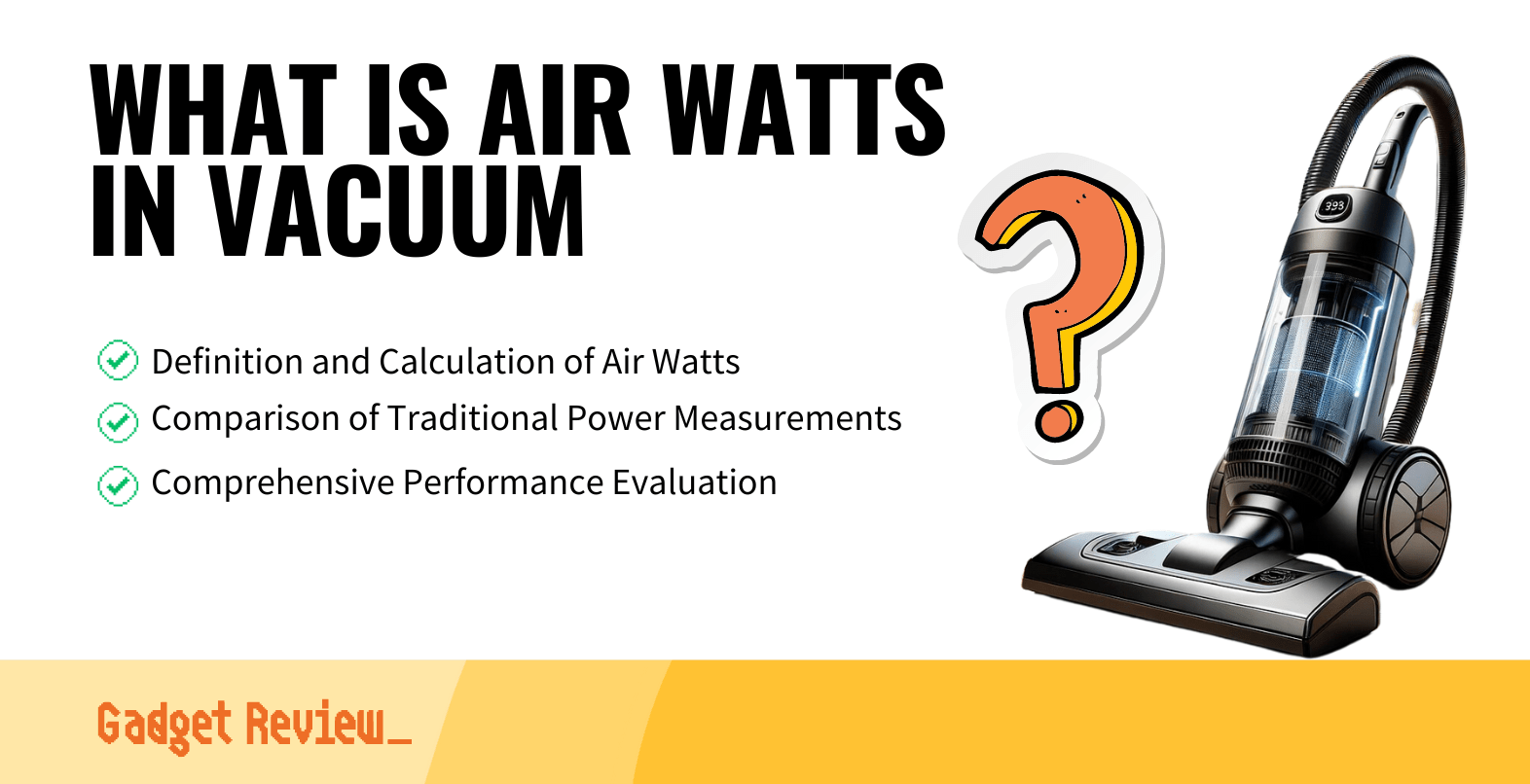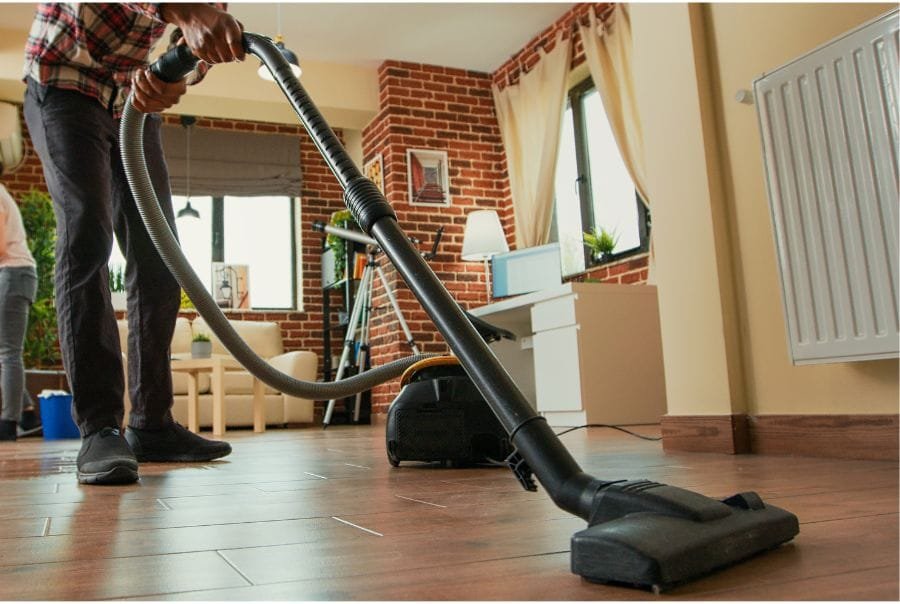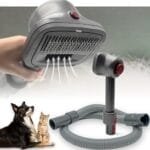Air watts measure a vacuum cleaner’s suction power. It combines airflow and water lift.
This metric helps determine how well a vacuum will clean. Understanding air watts can seem complex. Many consumers get confused by various specifications. This guide will clarify what air watts mean and why they matter. Knowing this can help you make an informed choice.
Let’s dive into the world of vacuum cleaners and uncover the importance of air watts for effective cleaning. Whether you’re buying a new vacuum or curious about your current one, this information is vital. Stay tuned to learn more about this key feature and enhance your cleaning power.
Introduction To Air Watts
Air watts measure the efficiency of vacuum cleaners. This unit combines suction power and airflow for effective cleaning. Higher air watts mean better performance.
### Introduction to Air WattsHave you ever wondered what makes a vacuum cleaner truly powerful? You might have come across the term “Air Watts” while shopping for one. Understanding this term can help you make a more informed decision. Let’s dive into what Air Watts mean and why they are important for vacuum cleaners.###Definition Of Air Watts
Air Watts measure the effectiveness of a vacuum cleaner. Specifically, they indicate the amount of power the vacuum uses to suck up dirt and debris.This measurement combines both airflow (measured in cubic feet per minute) and suction power (measured in water lift). Essentially, it shows how well the vacuum converts electrical power into cleaning power.###Importance In Vacuum Cleaners
Why should you care about Air Watts? Simply put, higher Air Watts mean better cleaning efficiency. This is crucial when you want to ensure your home is spotless.I once bought a vacuum with low Air Watts. I spent more time cleaning, and it still missed a lot of dirt. When I switched to a vacuum with higher Air Watts, the difference was noticeable immediately.Higher Air Watts mean you can clean faster and more thoroughly. This is especially important if you have kids or pets. Their messes need a powerful vacuum to handle them.Do you want to spend less time cleaning and more time enjoying your home? Then consider the Air Watts rating of your next vacuum cleaner. It could make all the difference.
Credit: www.cleva-uk.com
Measuring Air Watts
Understanding how to measure air watts is crucial for choosing the right vacuum cleaner. Air watts indicate the efficiency of a vacuum cleaner’s motor and suction power. This measurement helps you evaluate the vacuum’s cleaning performance.
Calculation Method
Calculating air watts involves two main factors: airflow and water lift. Airflow is measured in cubic feet per minute (CFM). Water lift, or suction, is measured in inches of water lift. To get air watts, multiply airflow by water lift, then divide by 8.5. This formula gives a clear measure of cleaning power.
Tools Required
Several tools are necessary to measure air watts. First, you need an airflow meter to measure CFM. Second, a water lift gauge helps you measure suction. These tools ensure accuracy in your calculations. You may also need a calculator for precise results.
Air Watts Vs. Regular Watts
Understanding the difference between air watts and regular watts can be confusing. Both terms are used in the context of vacuum cleaners. Yet, they measure different things. So, let’s break it down.
Key Differences
Regular watts measure electrical power consumption. They show how much energy the vacuum uses. This is important for energy efficiency. But it does not tell you how well the vacuum cleans.
Air watts, on the other hand, measure suction power. They tell you how effective the vacuum is at picking up dirt. Higher air watts mean stronger suction and better performance.
Impact On Performance
Air watts have a direct impact on how well a vacuum cleans. More air watts mean better suction. This leads to cleaner floors and carpets. Regular watts are less about cleaning power. They focus more on energy use. So, if you want a vacuum that cleans well, look at the air watts.
In summary, while regular watts measure energy use, air watts measure cleaning power. For the best performance, focus on vacuums with higher air watts.

Credit: www.gadgetreview.com
Advantages Of High Air Watts
High Air Watts in vacuum cleaners provide stronger suction, ensuring effective dirt and debris removal from floors and carpets. This leads to cleaner, healthier living spaces.
### Advantages of High Air WattsUnderstanding the advantages of high air watts in vacuum cleaners can help you make an informed choice. Air watts measure the efficiency of the vacuum cleaner’s suction power. Higher air watts mean better performance, which can make your cleaning tasks quicker and more effective.###Improved Suction Power
High air watts translate to more powerful suction. This means your vacuum can pick up more dirt, dust, and debris in a single pass.I remember upgrading my vacuum cleaner and noticing the difference immediately. The new one had significantly higher air watts, and I no longer had to go over the same spot multiple times.Have you ever felt frustrated by a vacuum that just doesn’t seem to get the job done? Higher air watts can solve that problem. A vacuum with improved suction power ensures that even the tiniest particles are sucked up, leaving your floors spotless.###Enhanced Cleaning Efficiency
When a vacuum cleaner has high air watts, it doesn’t just clean better—it cleans faster. This is because the powerful suction allows for deeper cleaning in less time.Think about it: less time vacuuming means more time for other activities. Whether you want to relax, spend time with family, or pursue a hobby, a more efficient vacuum can free up your schedule.Moreover, high air watts can be especially useful for those with pets. Pet hair and dander can be particularly challenging to remove. A vacuum with high air watts can easily tackle this issue, making your home cleaner and more comfortable for everyone.Wouldn’t you love to spend less time cleaning and more time enjoying your clean home? High air watts can make that a reality.Factors Affecting Air Watts
Understanding air watts in vacuum cleaners helps you make an informed choice. Several factors influence air watts, impacting the vacuum’s efficiency. Let’s dive into the key elements that affect this measurement.
Motor Power
The motor power directly impacts the air watts of a vacuum cleaner. A stronger motor generates more suction. This leads to higher air watts. High motor power ensures better cleaning performance. It helps pick up dirt and debris more effectively.
Design And Build
The design and build of a vacuum cleaner also affect air watts. Efficient airflow design reduces resistance. This maximizes suction power. The quality of materials used in the build matters too. Durable parts maintain optimal performance over time.

Credit: www.amazon.com
Choosing The Right Vacuum Based On Air Watts
Understanding air watts helps in choosing the right vacuum cleaner. It measures the suction power, determining how effectively the vacuum picks up dirt.
Choosing the right vacuum based on air watts can feel overwhelming. But understanding the basics can make your decision easier. Air watts measure the vacuum’s suction power, which directly affects its cleaning efficiency.Types Of Vacuums
Different vacuums serve different needs. Upright vacuums are great for large carpeted areas. They often have higher air watt ratings.Canister vacuums are versatile, ideal for both carpets and hard floors. They offer strong suction with maneuverability.Handheld vacuums are perfect for quick clean-ups. They usually have lower air watt ratings but are convenient for small tasks.Stick vacuums are lightweight and easy to store. They are best for light cleaning jobs and hard-to-reach places.Optimal Air Watt Range
So, what air watt range should you aim for? Generally, a vacuum with 100 to 200 air watts is effective for most homes.For heavy-duty cleaning, look for vacuums with higher air watt ratings. This ensures deep cleaning of carpets and removal of stubborn dirt.Handheld and stick vacuums often have lower air watts, around 20 to 100. They are best for quick, light cleaning.Remember, higher air watts mean stronger suction, but also consider the vacuum’s other features. Does it have good filtration? Is it easy to maneuver?Choosing the right vacuum involves balancing air watts with other practical features. What specific cleaning challenges do you face at home?Common Misconceptions
Many people misunderstand what air watts mean in vacuum cleaners. These misconceptions can lead to poor purchasing decisions and unsatisfactory cleaning results. Let’s clear up some of these common misunderstandings.
Air Watts And Noise
Some believe that more air watts mean a noisier vacuum cleaner. This isn’t true. Noise levels depend on the vacuum cleaner’s design, not its power.
For example, a high-end vacuum with advanced noise reduction technology can be quieter than a cheaper, less powerful model. So, don’t assume that more power always means more noise.
Energy Consumption Myths
Another misconception is that a vacuum with higher air watts consumes more energy. This isn’t necessarily the case. Air watts measure suction power, not energy use.
Modern vacuums are designed to be energy-efficient. A powerful vacuum can still be eco-friendly. Look for energy ratings and features like auto shut-off to make an informed choice.
Have you ever bought a vacuum based on these myths? How did it perform? Share your experience in the comments below!
Future Of Vacuum Cleaner Technology
The future of vacuum cleaner technology promises exciting changes. As we move forward, the focus shifts to efficiency and power. One important aspect is the measurement of air watts. This metric determines the cleaning power of a vacuum. Understanding air watts can help you choose the right vacuum.
Innovations In Air Watts
Manufacturers are constantly improving air watt technology. Newer models offer better suction and energy efficiency. High air watt vacuums pick up more dirt and dust. This results in cleaner homes with less effort. Advanced designs also make vacuums lighter and easier to use.
Upcoming Trends
The vacuum cleaner industry will see many new trends. Smart technology is becoming more popular. Some vacuums now connect to smartphones for remote control. Automated cleaning schedules are also a feature. This means your vacuum can clean while you are away.
Another trend is eco-friendly designs. More vacuums use reusable bags and filters. This reduces waste and helps the environment. Consumers can expect more sustainable options in the future. The focus on air watts will continue to grow. Better performance and efficiency will lead the way.
Frequently Asked Questions
What Is A Good Air Watt For Vacuum Cleaners?
A good air watt for vacuum cleaners ranges from 100 to 200 AW. This ensures strong suction and effective cleaning.
How Many Watts Is A Good Vacuum Cleaner?
A good vacuum cleaner typically has between 700 to 1500 watts. This power range ensures efficient cleaning performance.
How Much Is 1 Airwatt?
1 airwatt equals 0. 9983 watts. It measures the efficiency of vacuum cleaners in terms of suction power.
What Is A Good Airflow For A Vacuum Cleaner?
A good airflow for a vacuum cleaner is between 100 to 200 cubic feet per minute (CFM). Higher CFM ensures better suction and cleaning efficiency. Aim for a vacuum with strong airflow to effectively capture dust and debris.
Conclusion
Understanding air watts helps you choose the right vacuum cleaner. It measures suction power. Higher air watts mean better performance. This knowledge can guide your purchase. You’ll know what suits your cleaning needs. Happy vacuum shopping!





